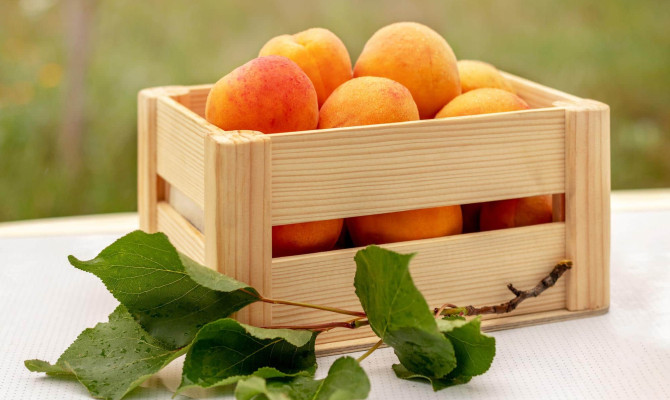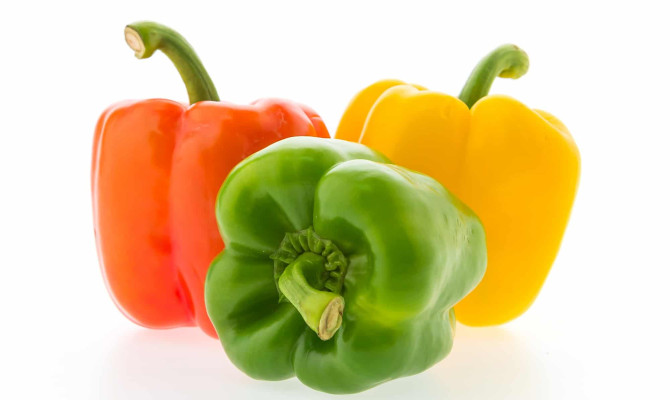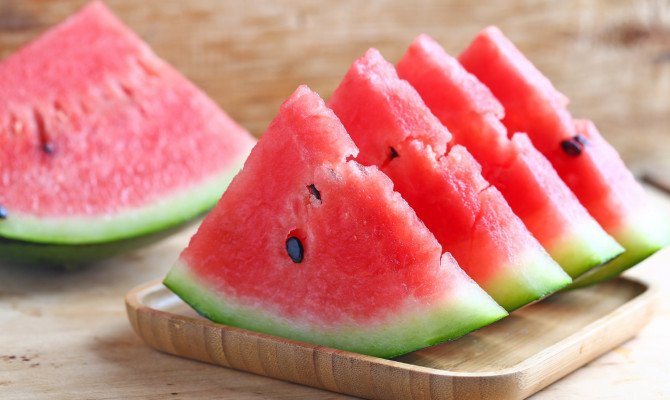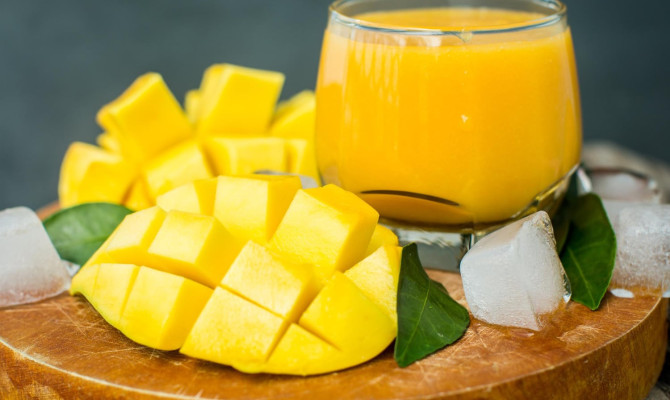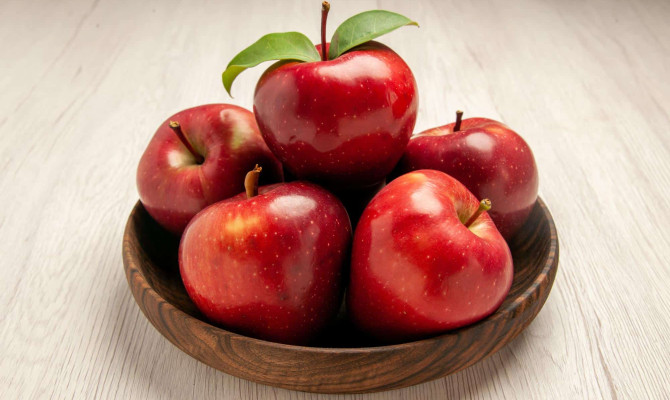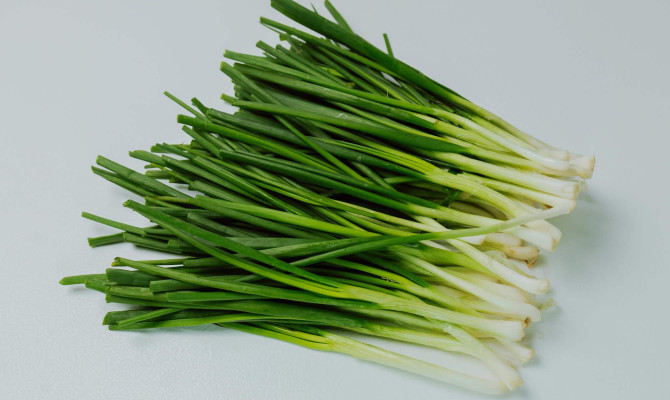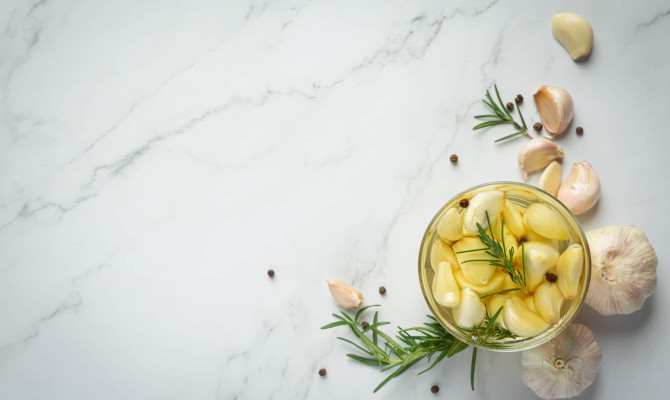Unveiling a Nutritious Grain called Khorasan Wheat

- Khorasan
- 22 Aug 2023
Overview
What is Khorasan Wheat?
Khorasan wheat is a prehistoric whole grain from the Poaceae family. It is a close kin of durum wheat and resembles the common wheat. The Khorasan wheat’s size is double that of wheat kernels and has a curved swollen shape and smooth texture with a tasty nutty flavor. It has many health benefits, and one can use it in a variety of meals as well as rice substitutes.
Unlike other wheat, Khorasan wheat is fragile and splits tremendously easily, so people need to harvest the crop carefully and do post-harvest management gently.
It is a good choice for organic farming as it is a drought-tolerant crop that yields high-quality wheat without artificial fertilizers or insecticides.
The article will give a quick glimpse of Khorasan wheat, its nutrition, potential health benefits, risk, and some tips to include in the diet.
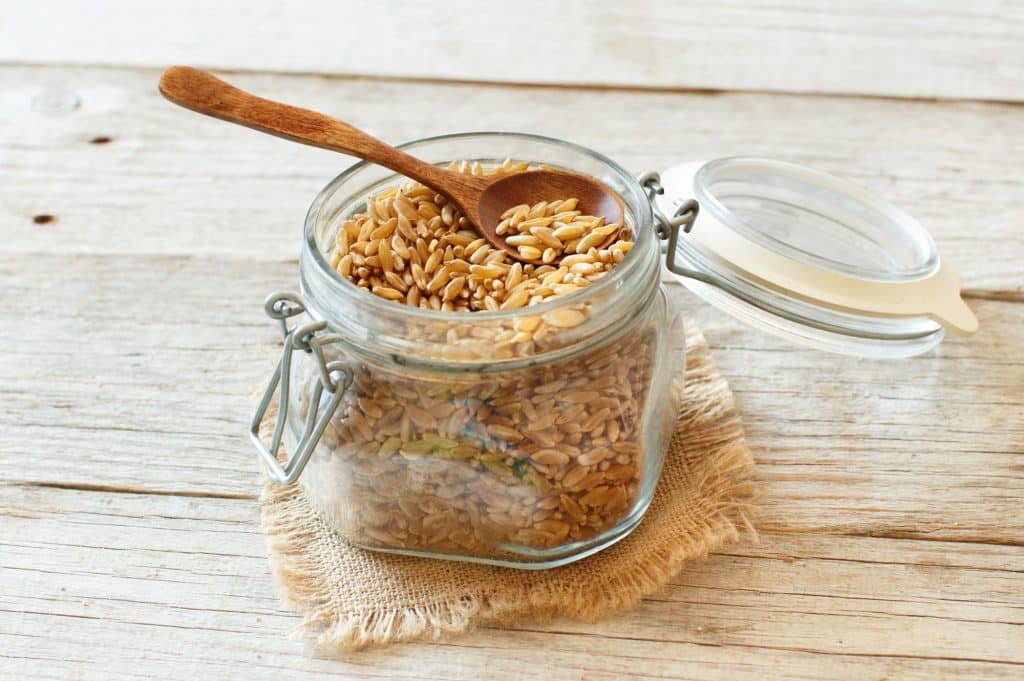
Here are some quick facts about Khorasan wheat
- The botanical name of Khorasan wheat is Triticum turanicum, and the brand name is Kamut
- Khorasan wheat is an indigenous crop of the Iranian territories of Khorasan
- Globally only 16000 acres of land are cultivated with Khorasan wheat and hence does not play a crucial role in the world’s agricultural economy 1Overview| Researched based study from Sciencedirect.com
Nutrition
Nutrition in Khorasan Wheat
170 grams of cooked Khorasan wheat consist of the following nutrients:
- Calories-227
- Fiber-7 gm (gram)
- Protein-10 gm
- Carbohydrate-48 gm
- Fat-1 gm
- Zinc -29% of DV
- Selenium-100% of DV
- Vitamin B3 (Niacin)-25% of DV
The daily value (DV) is the suggested amount to eat each day
The % daily value (%DV) is the daily value percentage for every part of the nutrient constituent in a portion of food served.
Other minerals and vitamins in Khorasan wheat
- Manganese
- Phosphorus
- Magnesium
- Copper
- Iron
- Thiamin
- Folate
- Vitamin B6 2Nutrition| Researched based study from Usda.gov
Fibers, vitamins, and minerals have the following function in our body:
- Fibers- It helps take up water and hasten the stool movement in the intestine, and it enhances gut health
- Zinc – It is a mineral that aids the immune system in combating infections
- Selenium-It helps in the regulation of thyroid hormone and helps protect against cell damage
- Vitamin B3 (Niacin)– It assists in appropriately utilizing fat and protein and keeps the skin and nervous system fit.
- Manganese- is a mineral the body requires to activate several enzymes of bodily processes and manage healthy bones.
- Phosphorus-it is necessary for maintaining healthy teeth and bones and helps repair the body’s cells and tissues.
- Magnesium -is indispensable for regulating muscle and nerve function as well as blood pressure and sugar levels in our body.
- Copper -helps maintain the nervous and immune system
- Iron- is a mineral desirable for the suitable growth and development of the body
- Thiamin (Vitamin B1)-It helps in the growth and role of various cells and helps change food into energy
- Folate (Vitamin B9)-is indispensable for usual cell functioning and tissue growth
- Vitamin B6- is needed to make the immune system function correctly and change food into energy
Bioactives in Khorasan wheat
Carotenoids
- Carotenoids are natural coloring pigments present in various plants
- It has antioxidant properties that nullify free radicals and decrease the risk of diseases
Omega-3-fatty acids
- Omega-3 fatty acids are healthy fats in fish and vegetables, including Khorasan wheat.
- It helps in the construction of the brain cells and also maintains the heart functioning 3Nutrition| Researched based study from Nlm.nih.gov
Health Benefits
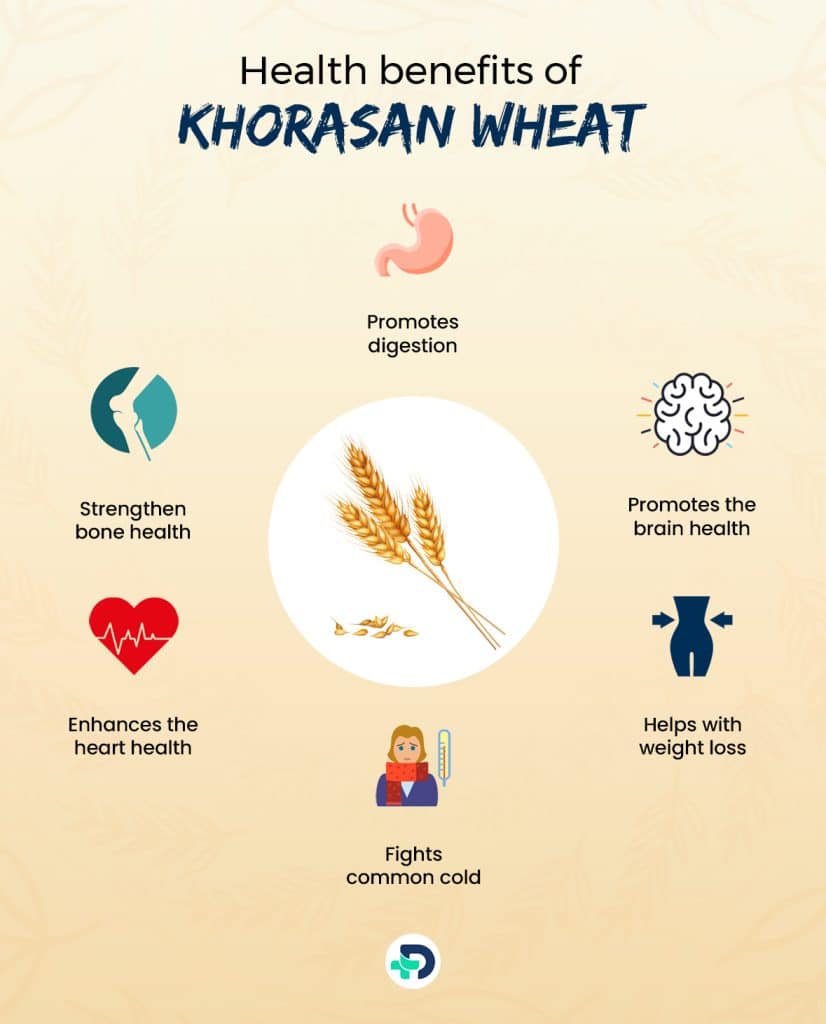
Health benefits of Khorasan Wheat
Khorasan wheat has the following health benefits:
- Promotes digestion
- Strengthen bone health
- Promotes the brain health
- Enhances the heart health
- Helps with weight loss
- Fights common cold
- Promotes hormonal balance
Promotes digestion
- Nutrients in Khorasan wheat help the growth of beneficial bacteria
- It regularizes the bowel movement and prevents constipation 4Benefits| Researched based study from Sciencedirect.com
Strengthen bone health
- Nutrients in Khorasan grain maintain the bone mineral density
- It decreases the risk of osteoporosis (bone disease) 5Benefits| Researched based study from Nlm.nih.gov
Promotes the brain health
- Nutrients in Khorasan wheat improve the thinking ability
- It reduces the risk of epilepsy (a brain disorder that causes sudden body movement)6Benefits| Researched based study from Nlm.nih.gov
Enhances the heart health
- Nutrients in Khorasan grain decrease the total cholesterol in the body
- It reduces the risk of heart diseases 7Benefits| Researched based study from Sciencedirect.com
Helps with weight loss
- Nutrients in Khorasan wheat keep the stomach full for a longer duration
- It decreases the calorie intake in the subsequent meals and decreases weight 8Benefits| Researched based study from Sciencedirect.com
Fights common cold
- Nutrients in Khorasan grain reduce the recovery time of common cold
- It decreases the symptoms associated with the common cold 9Benefits| Researched based study from Nlm.nih.gov
Promotes hormonal balance
- Khorasan wheat nutrients promote testosterone hormone production naturally in both men and women.
- It reduces the risk of sexual dysfunction in males 10Benefits| Researched based study from Tandfonline.com
Side effects
Side effects of Khorasan Wheat
Most people can well tolerate Khorasan wheat when taken in food quantities.
However, some people might come across the following side effects:
- Headaches
- Nausea and vomiting
- Stomach pain
- Indigestion
- Diarrhea
- Itching
- Hives
- Stuffed nose
- Swelling in the mouth, lips, face and tongue
- Trouble breathing 11Side effects| Researched based study from Nlm.nih.gov
Other Health due to Khorasan wheat:
- Khorasan wheat contains gluten, although less than other whole wheat products. Gluten is a protein usually found in most wheat varieties, including Khorasan. Gluten may be appropriate for a few.
- Gluten might destroy various helpful bacteria desirable for the digestive system in gluten-insensitive people. So, such individuals should choose non-gluten foods.
- Khorasan wheat is high in selenium. One must not consume it with other high selenium foods viz; brazil nuts, sea foods as more selenium consumption than the recommended daily intake can cause problems such as nail loss, hair loss, diarrhea, nausea, vomiting, and skin rash.The tolerable limit of selenium per day for adults is 400 mcg (microgram), while that for children 4 to 8 years age is 150 mcg.
- Moreover, there is limited evidence that selenium might interact with cisplatin (chemotherapy drug) used to treat certain cancers such as ovarian, lung, and bladder. So people on cisplatin chemotherapy must speak to a healthcare provider before taking Khorasan wheat 12Side effects| Researched based study from Nlm.nih.gov
Contraindications
Contraindications
Khorasan wheat might not be suitable for people with the following health issues:
- Allergic to the wheat
- People with celiac disease( a condition that damages the small intestine)
- People with gluten sensitivity
- People with digestive disorders
- People with reduced tolerance to fiber-rich food
- People with inflammatory bowel disease
- People with cisplatin medication (cancer drug) 12Contraindications| Researched based study from Nlm.nih.gov
Selection
Buying & Selection of Khorasan Wheat
One can buy Khorasan wheat online, from grocery stores, or local health stores throughout the year.
Selection
- While purchasing Khorasan wheat, one will get diverse names on the product label.
- Most people market Khorasan wheat with its trade name Kamut which Kamut International Limited holds. The grains having the Kamut trademark assures that the product is fully organic and not genetically modified.
Tips
Tips to include Khorasan Wheat in the diet
- Replace oats with Khorasan wheat and add honey, nuts, and fruits for breakfast.
- Make Khorasan wheat pasta and enjoy it with the pasta dish
- Add Khorasan wheat to soups and stews to increase the thickness
- Add cooked Khorasan wheat to salads to make it healthier
- Stir fry Khorasan wheat and relish the taste
- Cook Khorasan grain instead of rice and have it with a side dish such as chicken or fish
- Make chips or pita with Khorasan wheat flour and enjoy it as an evening snack.
- Make delicious baked items such as muffins, cakes, and cookies with Khorasan wheat flour and have them at any time of the day.
Alternatives
Alternatives to Khorasan Wheat
Khorasan wheat might not be suitable for people with gluten sensitivity or for people who are on a gluten-free diet. Those people can choose other gluten-free ancient grains to obtain the health benefits.
Some examples of gluten-free ancient grains are as follows:
- Millet
- Sorghum
- Amaranth
- Teff
- Fonio
- Quinoa 13Alternatives| Researched based study from Nlm.nih.gov
Storage
Storage of Khorasan Wheat
- Keep Khorasan wheat in airtight containers in a dry place away from direct sunlight. One can keep it as such for around three months.
- One can also store Khorasan wheat in the refrigerator for up to one year
- Once cooked, keep Khorasan grain in the freeze and consume it within a day or two
Takeaway
Key Takeaways
- Khorasan wheat is a nutritious, tasty ancient grain with several health benefits.
- Khorasan is high in fiber and contains several minerals and vitamins
- Khorasan wheat is easy to prepare, and one can add it to several food items such as stews, soups, and salads.
- One can add Khorasan wheat into the diet to get its health benefits. However, people with health conditions such as digestive issues and cisplatin chemotherapy must consult with a doctor before incorporating Khorasan wheat into their diet.
Any feedback on this article?
 This Articles content was accurate
This Articles content was accurate Very Informative Article
Very Informative Article I have a question or a comment
I have a question or a comment
 This article contains inaccurate content
This article contains inaccurate content This article was not helpful
This article was not helpful I have a question or a comment
I have a question or a comment
We appreciate your helpful feedback!
Checkout our social pages
References
-
Science Direct
Khorasan Wheat - an overview | Overview
-
U.S. DEPARTMENT OF AGRICULTURE
Wheat, KAMUT khorasan, cooked | Nutrition
-
National Library of Medicine
Evaluation of antioxidative and diabetes-preventive properties of an ancient grain, KAMUT® khorasan wheat, in healthy volunteers | Nutrition
-
Science Direct
Dietary fiber: a functional food ingredient with physiological benefits | Benefits
-
National Library of Medicine
Relationship between blood manganese and bone mineral density and bone mineral content in adults: A population-based cross-sectional study | Benefits
-
National Library of Medicine
Manganese and epilepsy: a systematic review of the literature | Benefits
-
Science Direct
Whole-grain and blood lipid changes in apparently healthy adults: a systematic review and meta-analysis of randomized controlled studies | Benefits
-
Science Direct
Dietary fiber and body weight | Benefits
-
National Library of Medicine
Zinc for the common cold | Benefits
-
TAYLOR and FRANCIS Online
Zinc improves sexual performance and erectile function by preventing penile oxidative injury and upregulating circulating testosterone in lead-exposed rats | Benefits
-
National Library of Medicine
Anaphylaxis to Kamut® flour in an adult patient: a case report | Side effects
-
National Library of Medicine
Are Ancient Durum Wheats Less Toxic to Celiac Patients? A Study of α-Gliadin from Graziella Ra and Kamut | Contraindications
-
National Library of Medicine
Gluten-Free Alternative Grains: Nutritional Evaluation and Bioactive Compounds | Alternatives












